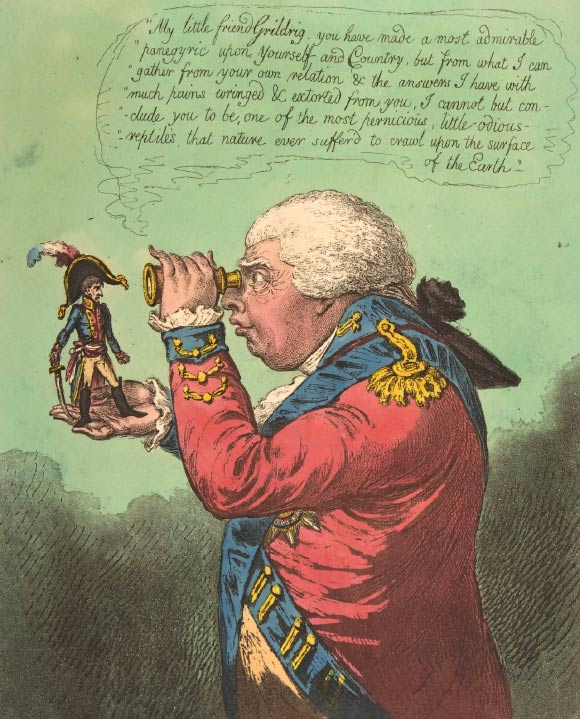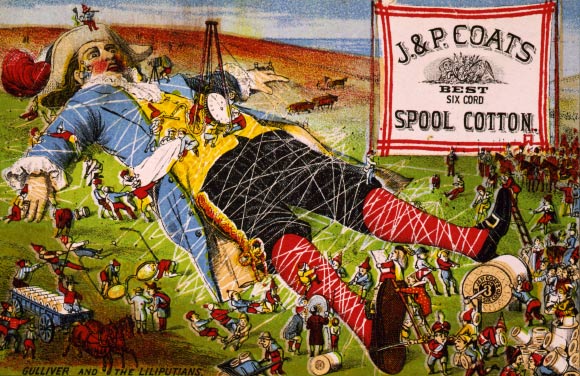According to Prof Irving Rothman from the University of Houston, mystery words in Jonathan Swift’s famous novel, Gulliver’s Travels, are, in fact, variations of Hebrew.

The King of Brobdingnag and Gulliver by James Gillray, 1803. Image credit: Metropolitan Museum of Art.
Gulliver’s Travels, published in 1726, reports the unlucky Gulliver’s various adventures, including his capture on the shores of the island nation of Lilliput by a race of people just six inches tall. Immediately upon his capture, Gulliver encounters a puzzling use of language.
“When Gulliver awakens to discover himself tethered to the ground, he finds himself face to face with a six-inch Lilliputian who utters the words Hekinah Degul,” said Prof Rothman, who is an author of the paper published in the journal Swift Studies.
“The words are repeated when the Lilliputians observe Gulliver drinking two hogsheads of a liquor resembling Burgundy. When he swallows….. the people shout Borach Mivola.”
“Jonathan Swift was an Anglican minister who studied Hebrew at Trinity College,” Prof Rothman noted.
He offers a lengthy list of examples as evidence of Swift’s use of Hebrew.
“The first is straightforward: readers are told the alphabet in the land of the giants – the Brobdingnags – consists of 22 letters. Hebrew relies upon a 22-letter alphabet, compared to the 26 letters of the English alphabet,” he said.
“Another example: the phrase Borach Mivola, shouted as Gulliver drinks the liquor, can be interpreted with Borach as a variant of the Hebrew Boruch, or blessed. Mivola, if spelled in the Hebrew manner mivolim, means complete defeat.”
“Swift’s application of the word Mivolam to Gulliver’s drinking of two hogsheads of liquor would have Swift show Gulliver drunk, boisterous among the Lilliputians, and oblivious of his misery. Thus Swift engaged in a witty synecdoche or a willful distortion in his satirical use of the Hebrew word.”
Prof Rothman said his strongest evidence is his interpretation of the book’s use of ‘yahoo.’
“Yahoo is used to describe the creatures Gulliver encounters in Book IV, a human-like species described as wild and irrational.”
“Many scholars in the critical history of the Travels are agreed that the most powerful single symbol in all Swift is the Yahoos. They represent….. the bestial element in man – the unenlightened, unregenerate, irrational element in human nature,” Prof Rothman said.

Trade card advertising J. & P. Coats spool cotton, showing Lilliputians tying up Gulliver, between 1875 and 1900. Image credit: Donaldson Brothers, Five Points, NY.
“Earlier interpretations suggesting the word comes from the four-letter holy Hebrew name of God, written YHWH and pronounced Yahweh.”
“Similar interpretations point to another four-letter name, YHVH, or Yahveh. Thus, the four-letter name for God, or tetragrammaton, is used by Swift to designate the Yahoo.”
He described his work as ‘breaking the code,’ relying on different sounds, or allophones, of the letter v, which can be pronounced v, oh or ooh. For the word Yahoo, Swift employed the ooh version.
That doesn’t, however, explain Swift’s use of the term to describe the unpleasant creatures.
“The Yahoos are described as Hnea Yahoo,” Prof Rothman said.
“The word Hnea, if read right-to-left as Hebrew is read, is the word ayn, or not. Those beasts are the opposite of God and the antithesis of God.
“Gulliver is not in any sense a Yahoo entirely devoid of godlike virtues. Indeed, Gulliver is a human being achieving saving grace, a hope not accorded to the Yahoo,” Prof Rothman concluded.
_____
Irving N. Rothman. 2015. The “Hnea Yahoo” of Gulliver’s Travels and Jonathan Swift’s Hebrew Neologisms. Swift Studies 30, pp. 160-175







